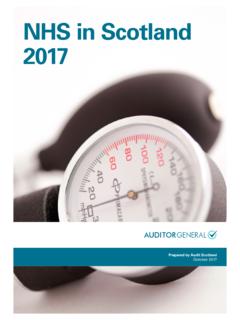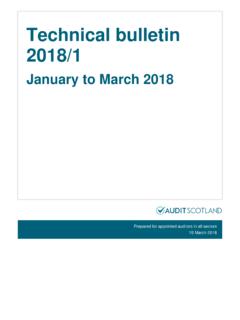Transcription of Health and social care series Self-directed support
1 Health and social care series Self-directed support 2017 progress report Prepared by Audit Scotland August 2017 . The Accounts Commission The Accounts Commission is the public spending watchdog for local government. We hold councils in Scotland to account and help them improve. We operate impartially and independently of councils and of the Scottish Government, and we meet and report in public. We expect councils to achieve the highest standards of governance and financial stewardship, and value for money in how they use their resources and provide their services. Our work includes: securing and acting upon the external audit of Scotland's councils and various joint boards and committees assessing the performance of councils in relation to Best Value and community planning carrying out national performance audits to help councils improve their services requiring councils to publish information to help the public assess their performance.
2 You can find out more about the work of the Accounts Commission on our website: Auditor General for Scotland The Auditor General's role is to: appoint auditors to Scotland's central government and NHS bodies examine how public bodies spend public money help them to manage their finances to the highest standards check whether they achieve value for money. The Auditor General is independent and reports to the Scottish Parliament on the performance of: directorates of the Scottish Government government agencies, eg the Scottish Prison Service, Historic Environment Scotland NHS bodies further education colleges Scottish Water NDPBs and others, eg Scottish Police Authority, Scottish Fire and Rescue Service. You can find out more about the work of the Auditor General on our website: Audit Scotland is a statutory body set up in April 2000 under the Public Finance and Accountability (Scotland) Act 2000.
3 We help the Auditor General for Scotland and the Accounts Commission check that organisations spending public money use it properly, efficiently and effectively. Self-directed support 2017 progress report | 3. Contents Key facts 4. Summary 5. Part 1. Directing your own support 11. Part 2. Assessing needs and planning support 22. Part 3. Commissioning for SDS 30. Part 4. Implementing the national SDS strategy 38. Endnotes 45. Easy read summary PDF available to download Links PDF download Web link Exhibit data When viewing this report online, you can access background data by clicking on the graph icon. The data file will open in a new window. 4|. Key facts In 2015/16: Amount committed by Scottish Government to support SDS. implementation1. Almost 70. million Length of time into the ten-year 7 Amount spent by social work SDS strategy years billion services2. Number of children and Number of their families Over At least people choosing supported by 17,000 53,000 an SDS option social work (estimated).
4 Services Almost 208,000. Number of adults who received non-residential support from social work services Notes: 1. Amount committed from 2011/12 to 2017 /18 by Scottish Government to support SDS implementation. 2. Councils' audited annual accounts, 2015/16. Summary | 5. Summary Key messages 1 Our evidence shows many examples of positive progress in implementing SDS. But there is no evidence that authorities have yet made the transformation required to fully implement the SDS. strategy. Most people rate their social care services highly and there are many examples of people being supported in new and effective ways through SDS, but not everyone is getting the choice and control envisaged in the SDS strategy. People using social care services and their carers need better information and help to understand SDS and make their choices. More reliable data is needed on the number of people choosing each of the SDS options.
5 Data should have been developed earlier in the life of the strategy in order to measure the progress and impact of the strategy and legislation. 2 social work staff are positive about the principles of personalisation and SDS but a significant minority lack understanding or confidence despite many about focusing on people's outcomes, or do not feel they have the examples power to make decisions with people about their support . Front-line of positive staff who feel equipped, trusted and supported are better able to help people choose the best support for them. What makes this possible progress for staff is effective training, support from team leaders or SDS SDS has not champions, and permission and encouragement from senior managers to use their professional judgement to be bold and innovative. yet been fully implemented 3 Authorities are experiencing significant pressures from increasing demand and limited budgets for social care services.
6 Within this context, changes to the types of services available have been slow and authorities' approaches to commissioning can have the effect of restricting how much choice and control people may have. In particular, the choices people have under option 2 are very different from one area to another. Authorities' commissioning plans do not set out clearly how they will make decisions about changing services and re-allocating budgets in response to people's choices. 4 There are tensions for service providers between offering flexible services and making extra demands on their staff. At the same time, there are already challenges in recruiting and retaining social care staff across the country owing to low wages, antisocial hours and difficult working conditions. 5 SDS implementation stalled during the integration of Health and social care services. Changing organisational structures and the arrangements for setting up, running and scrutinising new integration 6|.
7 Authorities inevitably diverted senior managers' attentions. Some experienced staff are also being lost through early retirement and voluntary severance schemes as the pressures on budgets mount. Recommendations Directing your own support Authorities should: work in partnership with service users, carers and providers to design more flexibility and choice into support options review their processes for supporting children to transition into adult services. The Scottish Government, COSLA, partners and authorities should: continue working together to develop: the accuracy and consistency of national data on the number of people choosing each SDS option methodologies to understand the impact of SDS on people who need support and their carers. Assessing needs and planning support Authorities should: provide staff with further training and help on identifying and planning for outcomes work with service users and carers to review their assessment and support planning processes to make them simpler and more transparent establish clear guidance for staff on discussing the balance between innovation, choice and risks with service users and carers and implementing local policies in practice support staff in applying professional judgement when developing innovative solutions to meet individual needs flexibly ensure they are providing information on sources of support to those who are accessing SDS.
8 Work with service users, carers and providers to review the information and help they offer to people during assessments, reviews and planning discussions. Summary | 7. Commissioning for SDS. Authorities should: develop longer-term commissioning plans that set out clearly how more choice and flexibility will be achieved for local service users and how decisions will be made to re-allocate money from one type of service to another work with service users, carers and provider organisations to develop more flexible outcome-focused contractual arrangements continue to work with communities to develop alternative services and activities that meet local needs. Implementing the national SDS strategy Authorities should: develop targeted information and training on SDS for healthcare professionals who have a direct or indirect influence on people's Health and social care support monitor and report the extent to which people's personal outcomes are being met and use this information to help plan for future processes and services.
9 The Scottish Government, COSLA and partners should work together to: review what independent information, advice and advocacy people will need in future, and how that should be funded after current Scottish Government funding for independent organisations comes to an end in March 2018. This review should fully involve users, carers, providers and authorities, and should conclude in time for appropriate action to be taken agree how any future financial support should be allocated, taking into account how authorities' local commissioning strategies will inform future spending priorities seek solutions that address the problems of recruitment and retention in the social care workforce ensure that the requirement to effectively implement SDS is reflected in policy guidance across all relevant national policies, such as Health and social care integration, community empowerment, community planning, housing and benefits routinely report publicly on progress against the 2016-2018 SDS.
10 Implementation plan and the SDS strategy. The Scottish Government should: report publicly on the outcomes it has achieved from the almost 70 million funding it has committed to support implementation of SDS. 8|. Background 1. social care services provide personal and practical help to improve the quality of people's lives and support them to live as independently as possible. social care support describes services and other types of help, including giving carers a break to help them continue in their caring role. support ranges from assistance with everyday tasks such as dressing and preparing meals to helping individuals live fulfilling lives at home, at work and in their families and communities. In 2015/16, councils spent billion on social work services, supporting almost 208,000 adults in non-residential care and over 17,000 children and their families. 2. Self-directed support (SDS) aims to improve the lives of people with social care needs by empowering them to be equal partners in decisions about their care and support .












